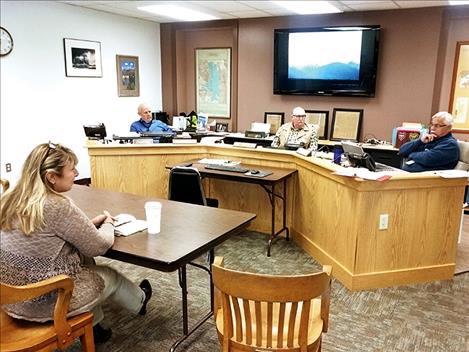Fighting to protect the Flathead
Flathead Basin Commission funding in doubt due to proposed budget cuts
Hey savvy news reader! Thanks for choosing local.
You are now reading
1 of 3 free articles.
POLSON — An impending state budget cut has forced the Flathead Basin Commission to consider alternative funding mechanisms, including a possible alliance with Lake and Flathead counties and the Confederated Salish and Kootenai Tribes.
The FBC is a state entity that was created in 1983 to protect the Flathead Basin — a large geographic area encompassing Flathead and Lake counties and a portion of Missoula County in the Seeley Lake area — from pollution resulting from coal mining and other natural resource extraction in British Columbia. It succeeded in that effort through a memorandum of understanding with British Columbia and a ruling by the International Joint Commission that a Canadian coal mine would harm fisheries in Montana.
Originally under the direction of the governor’s office, the FBC was later administratively attached to the Department of Natural Resources and Conservation, FBC Executive Director Caryn Miske said.
DNRC spokesman John Grassy said the state agency has proposed a cut of some $140,000 in the FBC’s budget for the current and next fiscal years. Although Grassy said the state would still honor legal contracts, the cut would mean that Miske would be out of a job unless other funds could be procured.
Miske said the proposed cut represents the organization’s entire budget - her salary of $85,000 and the remaining $55,000 used for operating expenses.
Gov. Steve Bullock has asked most state agencies to propose 10-percent budget cuts in response to declining revenue, at least part of which is related to firefighting efforts this summer. The state’s budget shortfall is estimated at $227 million.
DNRC Director John Tubbs said his state agency proposed $2.96 million in cuts over the two-year cycle. When asked to explain the proposed cut to the FBC, Tubbs noted that the state is funding $6.5 million for anti-aquatic invasive species efforts over the biennium. That funding represents a 600-percent increase over the previous budget that was just under $1 million, he said. As a result of legislation that was passed earlier this year, he said the state is funding 150 seasonal staff and 34-plus inspection or decontamination stations.
“Are we protecting the Flathead? Yes,” Tubbs said.
Miske met with Lake County Commissioners Gale Decker, Bill Barron and Dave Stipe on Oct. 3. During the hour-long back and forth session, commissioners were resolute in their willingness to support FBC.
Decker later said that cutting the FBC’s funding completely is a mistake, but added that they could deal with a 10-percent cut. He said the FBC has been ahead of the curve in fighting aquatic invasive species. FBC has funded a station on the south end of Kalispell at Jesco Marine and Power Sports and has helped the Blackfeet Tribe and CSKT with three stations on the Blackfeet Reservation and one in Pablo.
Should Flathead Lake become fouled with mussels, the Flathead Lake Biological Station at Yellow Bay has estimated that it would reduce the property values around the lake by 20-30 percent, Decker said.
The recently passed HB 622 lets the FBC establish a pilot program for mussel control in the Flathead Lake region but the rules for such a program are to be approved by DNRC, Miske said. She doubts however, DNRC will approve the rules by a March 1 deadline, which is when anti-AIS efforts normally begin in the state with inspection stations and public education efforts. Plans were to require all boats, including local, in-state and out-of-state, to be inspected prior to launch on Flathead Lake next year.
Miske, an attorney by trade, also performs a number of other duties for FBC, including fundraising. She said the FBC raised some $600,000 for the Blackfeet stations over the past two years through multiple grants.
A new governmental alliance?
Miske said Lake and Flathead counties could, along with CSKT, adopt anti-AIS ordinances as part of a joint venture. Lake County Deputy Civil Attorney Wally Congdon said the county could add an anti-AIS ordinance under its nuisance statute that also includes noxious weeds, for example. “We can regulate it as a nuisance today,” he said.
“If we could get an ordinance that worked here, we could get it adopted by the state,” Commissioner Barron said.
Miske said if such an alliance were created, the entity “would not have to deal with the state” for funding, although they would have to raise new funds or re-allocate some. The governor can cut the organization’s budget, but since the Legislature created the FBC it would not have to reorganize, she said.
“I think we gotta go out on a limb a little bit, but I think we can get it done,” Commissioner Decker said of the alternative plan should the governor implement DNRC’s proposal to defund the FBC.
Miske expressed her disappointment about the state’s anti-AIS efforts thus far.
“If we lose Flathead, we’ve lost the golden goose,” she said.
During their meeting, Lake County Commissioners and Miske concluded that politics played a role in the decision to cut the FBC’s budget. Miske noted that ultimately it’s up to the governor to make the decision. Gov. Bullock has talked about calling a special session of the state Legislature to find a better path forward.
Decontamination stations?
According to Miske, boats were routinely leaving the Tiber and Canyon Ferry reservoirs this year without being decontaminated even though the boat owners had paperwork saying they were.
“We hoped containment at Tiber and Canyon would be real,” she said, but added that what has been established there is “weak.” Mussel larvae were found last year at Tiber Reservoir and were suspected at Canyon Ferry and in the Missouri River.
Miske said two inspection/decontamination stations were set up at both Tiber and Canyon Ferry earlier this year. There are multiple launch sites at those lakes and boaters are directed to an inspection station when leaving. Some stop and some don’t, she said, adding that no one forces them to stop. In addition, she said that Montana Fish, Wildlife and Parks changed the definition of decontamination this year. This resulted in boats being inspected and deemed decontaminated because they were “clean, drained and dry” but not necessarily decontaminated, she said.
Jay Monroe, the AIS program coordinator for the Blackfeet Tribe, confirmed Miske’s comments. He said several boats came from a walleye tournament on Tiber Reservoir in May. These boats had a purple hitch seal that meant they passed inspection. Their paperwork, an “AIS mussel-free risk assessment form,” said they had been decontaminated and that a hot wash wasn’t necessary. However, Monroe noted that a full decontamination consists of washing the interior of the boat with a water temperature of at least 120 degrees and the exterior at 140 degrees. But since these boats had been deemed clean by a state agency (Fish, Wildlife and Parks), Monroe said there wasn’t a whole lot that his inspectors could do.
He also said that two mussel-fouled boats were stopped earlier this year at Blackfeet stations located on U.S. 2 west of Cut Bank, on Highway 89 at Birch Creek and U.S. 2 west of Browning. Both boats stopped came from the Midwest. In one case a Columbia Falls-area man purchased a boat that had been on Lake Michigan and intended to sell it in Montana. The other boat was also from the Midwest and its owner intended to launch on Flathead Lake. Both were given a white failed inspection hitch seal and directed to the Whitefish Lake Institute for “hot-wash” decontamination. The Whitefish Lake Institute and Fish, Wildlife and Parks were notified about each case, he said.
The fine for launching with a white hitch seal is $10,000, Monroe said.
Barron said some boaters have bypassed open inspection stations in Lake County without being cited. “After you catch him, what do you do? Nothing,” he said. “It should’ve been a felony.”
He said law enforcement has stopped and escorted some violators back to an inspection station.
“You only have to write a handful of tickets and word gets out,” Miske said. Violators can be cited and fined $85 for not stopping at an inspection station.
Inspectors across the state found nine boats with mussels this year, including the two in Browning and one in Kalispell, according to CSKT’s aquatic invasive species coordinator Erik Hanson. Those findings point toward the need for continued anti-AIS efforts. Regardless of how budget cuts are handled, local entities will continue to be involved in the battle.

















